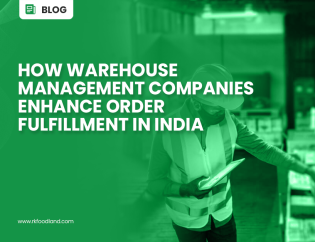
[Avg. Read Time: 4 mins]
Maintaining the quality of perishable and temperature-sensitive goods is paramount. From preserving the perishable goods in warehouses, to transit and delivering the product at right place, the consistency of temperature matters. Storing cold products at inappropriate temperatures leads to affected quality, damage or waste.
Food industries and businesses dealing with temperature sensitive or perishable products come across numerous challenges while accomplishing the customer requirements. To tackle these challenges wisely, cold chain management works as a reliable solution.
Being one of the cold chain logistics companies, we have shared the importance of cold chain management, which helps to safeguard the quality of temperature-sensitive goods.
Understanding Cold Chain Management
Cold chain management is the process of maintaining the integrity and quality of perishable and temperature-sensitive goods throughout their entire journey, from production to consumption. The procedure comprises a range of activities that include storage, transportation, and handling of products, all under controlled temperature conditions. In the open market for buyers and sellers, the products are transported over long distances and in varied climatic conditions, relying on cold chain management.
Importance of Cold Chain Management
- Preserves Product Quality
- Minimizes Waste
- Ensures Regulatory Compliance
- Meets Customer Expectations
- Improves Product Safety
- Drives Innovation and Sustainability
The key benefit of cold chain management is its ability to safeguard the quality and freshness of products. Whether it's farm-fresh produce, pharmaceuticals, or frozen foods, maintaining the optimal temperature throughout the cold supply chain is essential for preventing spoilage and preserving shelf life.
Let's say a shipment of delicate seafood is making its way from the coast to urban markets. Without proper temperature control, the freshness of the catch would be compromised. It would lead to dissatisfied customers and financial losses for businesses.
Implementing cold chain management practices reduces waste in the supply chain. By maintaining precise temperature control, companies can minimize the risk of product spoilage and shrinkage. This maximizes the efficiency and minimizes environmental impact.
To understand better, consider the dairy industry, where stringent cold chain protocols are practiced ensuring that milk and dairy products remain fresh and safe for consumption. Implementation of the cold chain management reduces the incidence of unsellable inventory and food waste.
With strict regulations governing the storage and transportation of perishable goods, adherence to cold chain standards is not just a matter of quality assurance but also regulatory compliance. If businesses or industries fail to comply with these standards, it can result in fines, product recalls, and damage to brand reputation.
Consider the example of pharmaceutical companies, where they must adhere to strict cold chain protocols to ensure the efficacy and safety of temperature-sensitive medications. Any deviation from these standards can cause serious consequences for public health and regulatory compliance.
Today, businesses are altering their strategies based on customer behaviour. Hence, customer expectations are kept on top and ensured that product quality and freshness are maintained. Proper end-to-end fulfillment allows businesses to meet and exceed these expectations, which ultimately promotes customer loyalty and trust.
For instance, online grocery retailers who focus on delivering fresh produce and perishable goods directly to customers' doorsteps mostly rely on integrated cold chain logistics. It offers convenience and doesn't let the quality compromise while improving customer satisfaction.
Cold chain management, while preserving product quality, also improves safety by mitigating the risk of contamination and bacterial growth. Maintaining consistent temperature controls throughout the cold supply chain reduces the likelihood of foodborne illnesses and ensures that products meet strict safety guidelines.
Given an example, in the meat processing industry, adhering to cold chain protocols is essential to prevent the proliferation of harmful bacteria. Cold chain management helps to safeguard consumer health and brand reputation equally.
t comes to packaging, transportation, and energy efficiency, cold chain management brings innovation by implementing sustainable supply chain practices. Whether using eco-friendly packaging material or energy-efficient refrigeration technologies, businesses and industries look forward to implementing innovative solutions to reduce environmental impact and optimize resource utilization.
In cold chain logistics, the advanced insulation materials and energy-efficient refrigeration systems are adopted by companies. It helps to reduce carbon emissions as well as lower operational costs for businesses that promotes long-term sustainability and environmental stewardship.
Cold chain management is a strategic solution for food businesses and industries that are striving to stay competitive in the market. If you are looking for cold chain logistics in India, choose RK Foodland. Being renowned for providing solutions for cold chain logistics in India, we offer remarkable outsourcing solutions for integrated planning, sourcing, warehouse management, transportation services, order management, and integrated fulfilment.
Focusing on our cold chain management services and end-to-end fulfillment, our supply chain management professionals implement the best strategies to streamline the supply chain and improve its visibility. Understanding your business requirements and cold supply chain shortcomings, our professionals tailor the strategy to drive desired outcomes.
By opting for integrated fulfilment solutions and cold chain management, businesses can achieve results such as on-time deliveries, end-to-end visibility, increased reach, improved insights, reduced risk, and many more.
Connect with RK Foodland today for cold chain management solutions!
Frequently Asked Questions (FAQs)
Cold chain management is particularly important in India due to the varying climatic conditions from region to region. It helps to maintain the freshness and quality of perishable and temperature-sensitive goods such as fruits, vegetables, and dairy products.
By maintaining precise temperature ranges throughout the supply chain, cold chain management helps minimize the risk of product spoilage and shrinkage, thereby reducing waste and maximizing efficiency.
Regulatory requirements for cold chain management vary depending on the type of product and jurisdiction but typically include adherence to temperature control standards, documentation of temperature records, and compliance with hygiene and safety regulations.
RK Foodland offers comprehensive, integrated cold chain logistics solutions, including temperature-controlled storage, specialized transportation, and value-added services, such as inventory management and order tracking, for the integrity and quality of your products throughout the supply chain.









